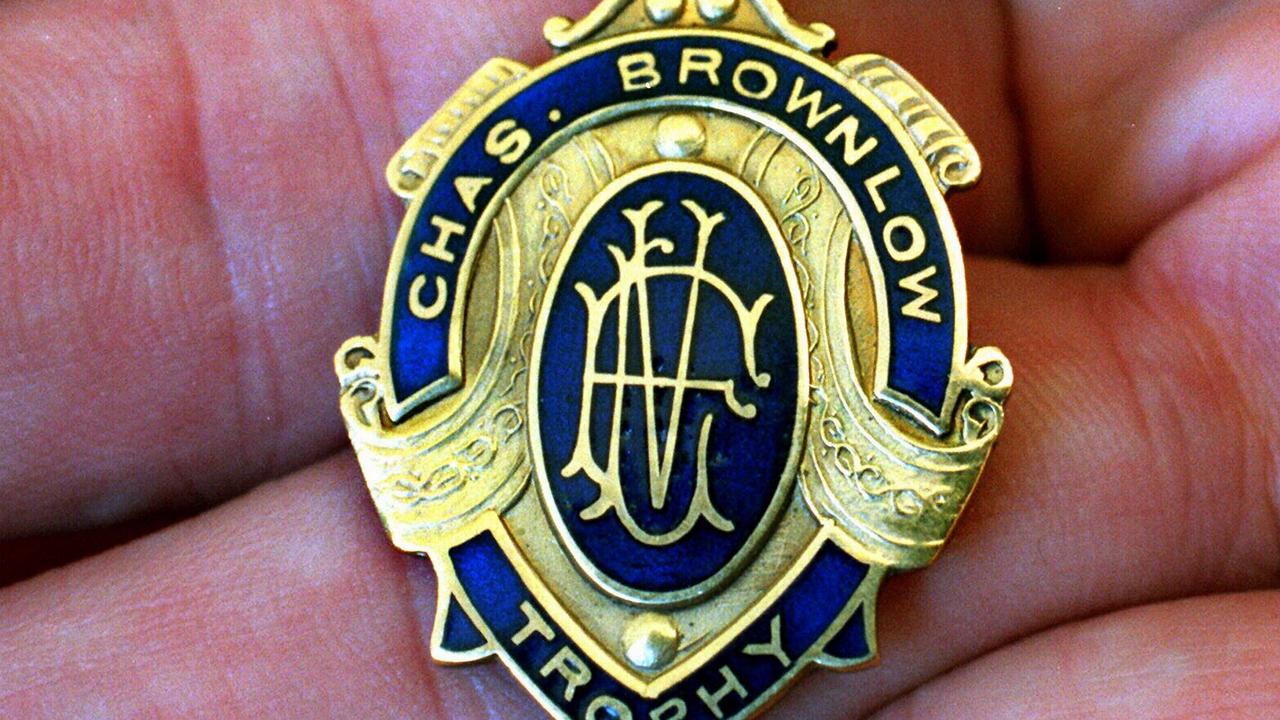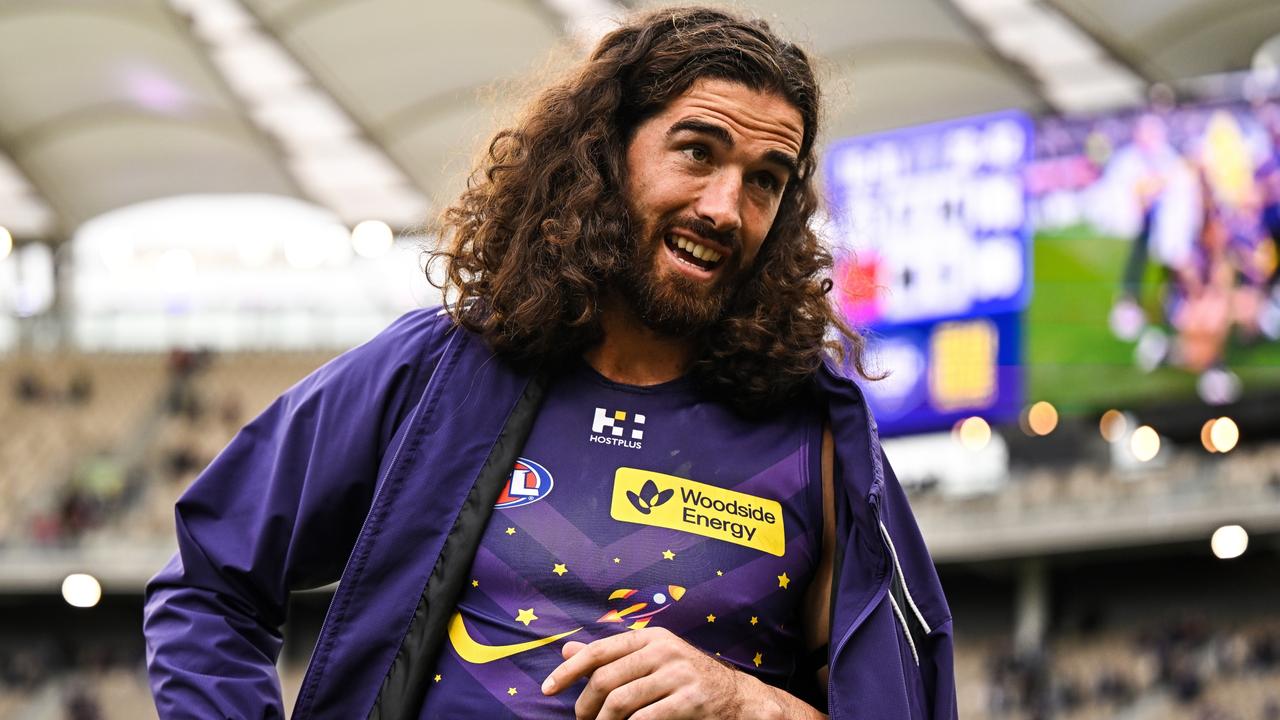How Stuart Dew and the Gold Coast Suns helped change the club’s AFL fortunes
Sacrificing salary, deep list cuts, a hardnosed game style built from the ground up and a preseason tactic that ensured the days of the fadeouts were over. This is how Stuart Dew and the Suns turned the once struggling club around. WATCH THE FULL INTERVIEW HERE >
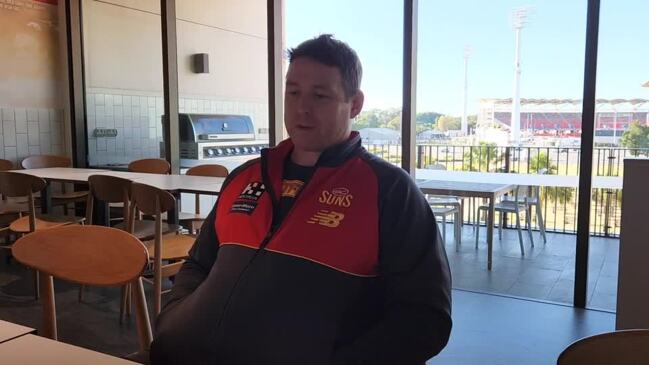
AFL
Don't miss out on the headlines from AFL. Followed categories will be added to My News.
For the first time since 2014 Gold Coast are in the hunt for the AFL finals.
It’s been a long road after a huge five-year rebuild across the entire football department and playing list under coach Stuart Dew who has signed a two-year contract extension that will tie him to the Suns until the end of 2024.
With his future secure, we take a look back at Dew’s tenure at the helm of Gold Coast and how he and his team turned a battling football club into one of the AFL’s most exciting teams.
2018: PUTTING A CAP ON IT
In the wake of the high profile exits of Rodney Eade, the club’s second coach, and football manager Marcus Ashcroft, Suns CEO Mark Evans and the board landed on Stuart Dew as the man who could take a fledgling team and build it into something.
Connection with the players, a modern game style and an ability to retain players after years of Gold Coast’s best walking out the door were key among the objectives.
Dew, football manager Jon Haines and list manager Craig Cameron delivered a five-year plan to Evans and the board. By the fifth year, 2022, they wanted a team who could not only compete for a spot in the finals, but do it every year.
Key to it was time. They knew there would be short term pain but Evans and chairman Tony Cochrane, along with the whole board, have always been clear they would give Dew the time he needs to get it done.
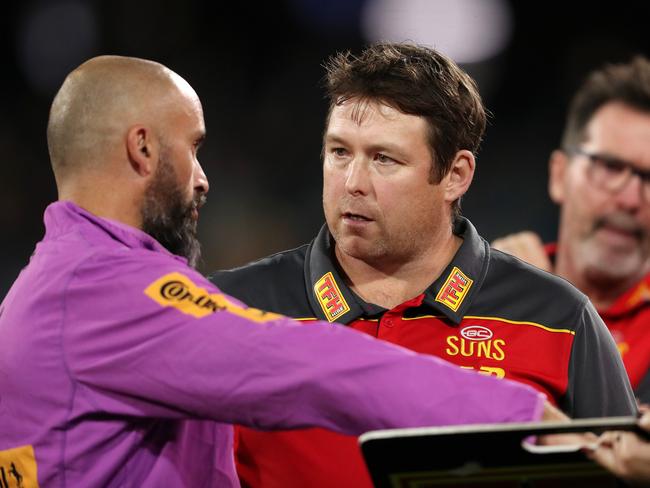
Dew’s first challenge, alleviating the pressure on a salary cap under enormous strain after years of paying overs to either keep players at a young and struggling club or to lure recruits to a non-footy state.
“I’d seen there had been a lot of changes and there had been a lot of upheaval,” Dew said.
“Without stability you can’t get anywhere. To stabilise the team, the playing list and also the off-field stuff is important.
“The playing list was going to be a tricky one. To stabilise that can be difficult because you have historical contracts, you have got to make some decision and have a clear view of what the coming drafts are.
“The first big decision we made was to cut the list really deep after the first year. There is always a risk involved in that in terms of the right characters we kept and the right characters we got through the door. We feel the core of a really strong footy side is here.”
“(The cap) was under enormous pressure, particularly for where we were on the ladder (17th in both 2017 and 2018),” Dew said.
“That can take anywhere between two and four years to correct and get it to a position where you are comfortable with where your risk is, where you’re carrying the most weight.
“That is so important to get right. We have made calls where people might scratch their heads but at the end of the day it has been about the salary cap as much as on-field as well.
“At times we have had to find people who do the same thing for a little bit less to try and balance the books. We feel we have it now into a position where most footy clubs are.
“The more you win the more you can go to players and say ‘look if we stay together, if you take a little bit less’ they can see light at the end of the tunnel.
“I feel like the characters we have got here, we have been able to get some guys to make some small sacrifices to keep people in the door.
“That is across the board. That was players coming in, some senior players that were here but also some younger players who understand too. There is a maturity with that group regardless of age who understand.”
The list-build was simple, use the high draft picks over what many recruiters believed were talent crops stacked with quality players to bring in the cattle that could turn into elite players then surround them with strong characters who didn’t break the bank.
The club hit a hurdle at the end of Dew’s first season when Tom Lynch and Steven May exited. Lynch chose to join Richmond while May’s departure was as much Gold Coast’s decision as it was his.
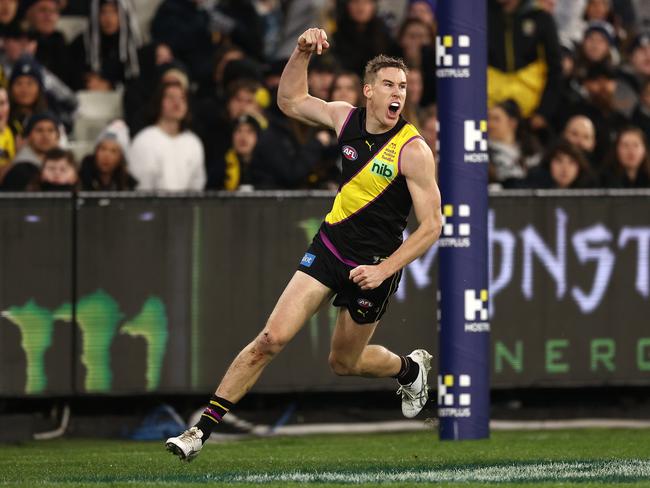
Dew still holds both in high regard. It was a blow in one regard but fast-tracked a cultural movement as the Suns, led by future co-captains David Swallow and Jarrod Witts, who took it upon themselves to recommit before they were out of contract.
“They wanted to show the playing group that they were up for it,” Dew said.
Around sixteen established players left the club via trade or by being delisted, with Lachie Weller the key recruit from Fremantle. The Suns gave up pick 2 to bring him from Fremantle back to Queensland and despite the move being criticised at the time, Dew believes it has been a big win for the club.
“We would do it again,” he said.
“He was ready to go. We knew we were going deep, he was in the slot where we thought he could play here the next 10 years.
“He has a real connection to the club and Coast and even now we miss him while he is out (injured). Having a guy who can kick like that, that speed, play in any position, that is pretty handy.”
With all that happening, Gold Coast were unable to play at their home ground of Metricon Stadium for the opening nine fixtures while the city hosted the 2018 Commonwealth Games.
“I just thought it was a great opportunity to get to know each other and further embed what we want the footy club to look like,” Dew said.
“Little did we know that period set us up and we had some leanings for what came in the Covid times. Some teams didn’t enjoy the hubs but we always look for what we can do.
“Four or five times we got about two hours notice to get to the airport, say goodbye to families and not know when we are coming back. That was extreme but when we got away we were well versed on how the program should look.”
The club rounded out the year by recruiting star top 10 draft picks Jack Lukosius, Izak Rankine and Ben King while recruiting mature-age players Sam Collins, Josh Corbett, Chris Burgess, Jordan Murdoch, Anthony Miles, Corey Ellis, George Horlin-Smith, Jack Hombsch, Aaron Young and Harrison Wigg.
Ladder finish: 17th: 4 wins, 18 losses.
2019: INSTLLING THE GAME STYLE
The first two seasons of Dew’s time at the helm were largely spent instilling the game style he believed would enable the team to compete against the best.
But those early stages didn’t boast the expansive and fast moving footy the team, and most of the league, is playing in 2022.
Defence was key. It was the foundation of the Suns game that they could build off. The football department was conscious not to make the game plan too complex for a young group who needed to learn the rigours of hitting hard in the contest while building their bodies.
“It was about teaching the boys there is a skilful game and there is a hard game,” Dew said.
“I feel like we can always work on the skill but it is harder to teach the harder game. You need time in the boots doing that and collision time.
“We did have to learn to defend, knowing it was going to be hard. We were going to be young and under the pump but we had to learn how to fight.
“You want to keep the challenge point just in front and not too far ahead where they think it is too much.”
Among the changes for 2018 was the exit of high performance manager Justin Cordy who was replaced by a man Dew said is one of the best recruits Gold Coast has secured, Alex Rigby.
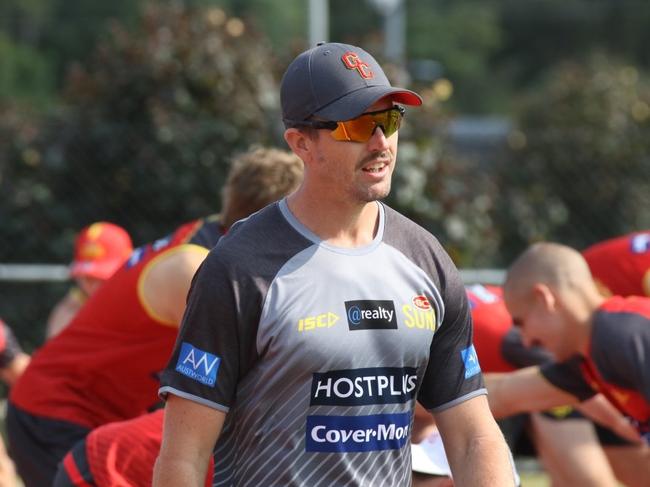
Rigby was promoted from a role in injury rehab at the club, beating-out an international field that included Adam Beard who has overseen strength and conditioning for the NFL’s Cleveland Browns and the British and Irish Lions rugby union, to win the job.
The Suns had been crippled by injury for years but under Rigby’s watch the club has enjoyed a largely clean bill of health for most of its list.
“Alex Rigby was probably one of our best recruits who people might not hear about. He is our high performance manager and he put a lot of work in,” Dew said.
“A lot of other guys with maybe better resumes but this guy is as good as I’ve ever seen, and I’ve seen some good ones.
“He has had a big say in building the brand and team that can run and compete physically.
Swallow and Witts were named co-captains of a young side
David Swallow and Jarrod Witts named were co-captains, the duo taking on enormous responsibility for a young playing group that needed strong leadership and direction.
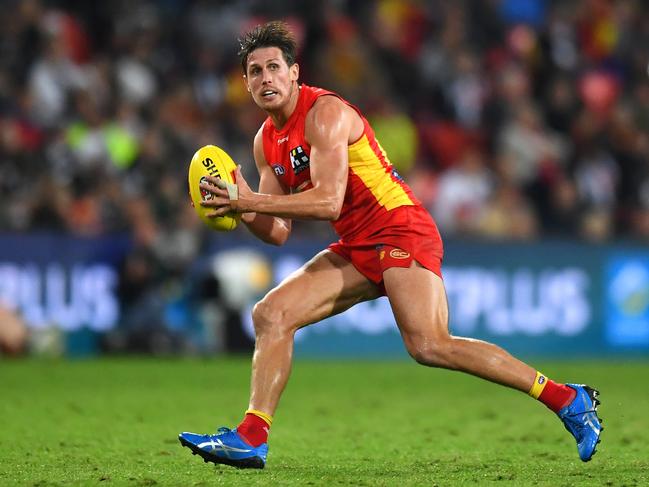
The Suns failed to win any more than six games between 2015 and 2019, sparking the AFL to step in and provide concessions in a bid to turn the club around.
Matt Rowell arrived with pick one of the draft but was joined by best mate Noah Anderson with pick 2, granted to the Suns as part of the rescue package. Connor Budarick, Sam Flanders and Jeremy Sharp were also drafted while Brandon Ellis, Hugh Greenwood and Zac Smith were also signed.
Gold Coast were also granted access to Darwin as an Academy zone and given the power to list up to 10 rookies.
Dew overhauled part of his coaching department, bringing in development coaches Tim Clarke and Tate Kaesler along with Head of Development & Integration Josh Francou.
The first bid to turn the tide on the club’s retention issues took shape, with Rankine, Lukosius and King all re-signing until the end of 2022.
Ladder finish: 18th: 3 wins, 19 losses
2020: A PERCENTAGE GAME
A year that turned the AFL on its head with the arrival of Covid.
Gold Coast felt the force of heightened safety protocols but the decision of the AFL to largely use Queensland-based hubs to get through the season played into the Suns hands.
On-field the expectation shifted.
It was now about becoming more competitive. It was the second year of the 6-6-6 rule and Dew knew there were going to be teething issues leading into it.
While some teams played extra men behind the ball leading into 2019 Dew opted against it, knowing they had to prepare. It meant losses exceeding 60 points were felt numerous times.
But in a shortened 17-game season Gold Coast hit a key performance indicator, improving its percentage from 60.5 in 2019 to 90.6 in 2020.
The playing group began to become bolder with its ball movements but turnovers often hurt the side going back the other way.
“(The percentage) is a reflection of how competitive you are,” Dew said.
“Are you making growth in your offence and defence. At different times we have been opened up. I remember games in 2018 and 2019 where I didn’t want to put two guys behind the ball.
“We probably copped some heavier losses then we could have but I thought it was important to teach our boys to fight it out and we had a feeling they would bring in the 6-6-6 rule.
“We had to learn how to deal with the adversity and learn how to fight. I had the vision we would get there in the end.”
The loss of talented No.1 draft pick Matt Rowell to a season-ending shoulder injury in Round 5 was an early set back for both player and club.
But they were in the contest. As became custom the side started the season with promise but faded out after the mid-season bye, limping home with one win from the last 10 games.
With 20 of the club’s core group re-signing in the 18 months leading up to 2020, the Suns list strategy shifted in 2021.
Dew and the football department believed they now had the core nucleus of players who they wanted to bring through together. The aim was to now build their synergy by playing games together.
Crucially, the Suns extended the contracts of Rowell and Anderson until the end of 2023 while also bringing in the likes of Oleg Markov and Rory Atkins.
Gold Coast also pre-listed North Queensland product Alex Davies and Darwin’s Joel Jeffrey as part of the concessions granted to the club by the AFL.
Among those to depart the club was key forward Peter Wright who was traded to Essendon while popular senior assistant Dean Solomon was let go in a move that shocked many.
Topping it off, Dew re-signed until the end of 2022 after three years at the helm.
Ladder finish: 14th: 5 wins, 11 losses, 1 draw.
2021: INCONSISTENCY
A year marked by huge highs and lows.
An ACL injury to co-captain and ruckman Jarrod Witts in Round 3 were enormous blows to a team that also had Matt Rowell, Sam Day and Connor Budarick suffer set backs.
Witts was the one they felt the most though.
“Not having Witts last year, we were going into a fight with one hand tied behind our back,” Dew said.
The greatest frustration for the club was the inconsistency of performances, either from game to game or quarter to quarter.
They showed glimpses of some impressive football but they also played some of their poorest football under Dew at times. Pleasingly for Gold Coast, five of their losses came by just two goals or less.
Touk Miller was a shining light and the AFL world took notice. He averaged over 30 disposals a game, was labelled the hardest two-way runner in the league and became an All-Australian.
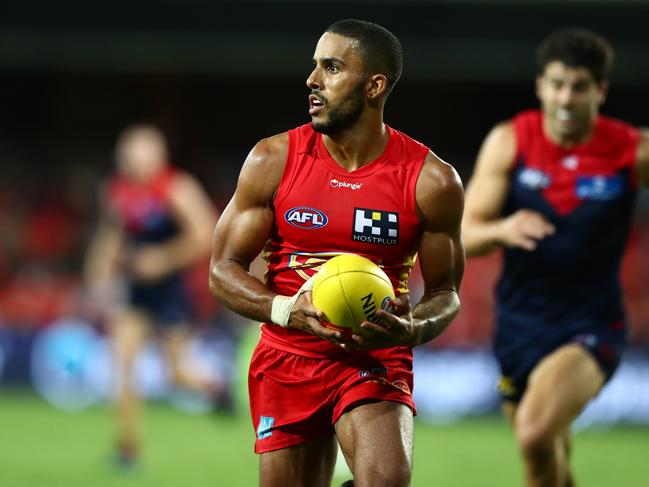
On the flip side talented small forward Izak Rankine struggled to find form and found himself playing in the reserves at the back end of the season.
Despite the ebbs and flows of the season, Gold Coast still managed to get their most wins for Dew, seven, since his arrival.
The trade and draft periods brought with it huge drama for the Suns. They brought in tall Ned Moyle via pick 5 during the mid-season draft, secured Mac Andrew with pick 5 of the national draft and Charlie Constable.
They traded in Mabior Chol, signed Levi Casboult and James Tsitas but delisted Will Brodie who has found form at Fremantle.
The Suns moved Rory Thompson to the rookie list but were left red-faced when Hugh Greenwood was snapped up by North Melbourne in the period between his delisting and the rookie draft.
Football manager Jon Haines left the club at the end of the year and was replaced by Wayne Campbell.
Ladder finish: 16th: 7 wins, 15 losses.
2022: STAYING THE COURSE
In a year of heighten pressure the Suns have made one of the biggest decisions of its history, to re-sign Stuart Dew who has become the longest serving coach of the club.
It comes off the back of Ben King and Jack Lukosius’ recommitment while Izak Rankine is expected to pen a new two-year deal with the Suns.
Gold Coast started at 2-5 this season, with some critics calling on the AFL to step in and catapult premiership coach Alastair Clarkson into the role.
But chairman Tony Cochrane and CEO Mark Evans backed their man. They sat down with Dew in February and said progression was the only thing they wanted to see.
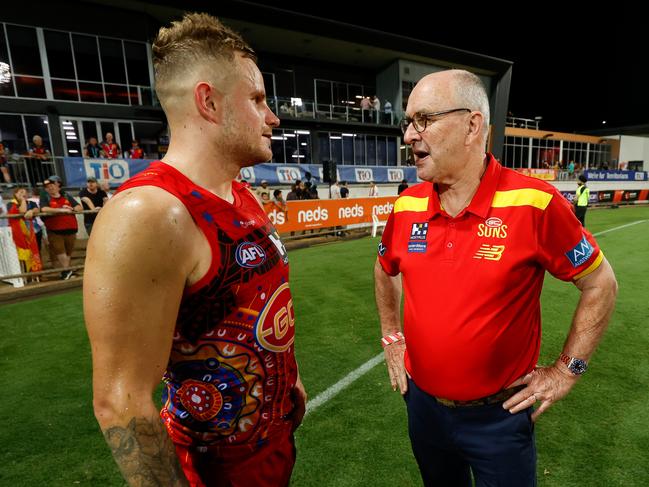
They got it. Gold Coast are 8-8 after beating Richmond after the siren on Saturday.
It was a huge bounce back after two agonsing losses against Port Adelaide and Collingwood by a combined seven points, and they remain in the hunt for finals going into Round 17.
The Suns have been able to stop massive momentum swings and produce a run of consistent performances, two things the board wanted to see before re-signing Dew.
The fade-outs of previous years hasn’t been felt, with Dew and his team adjusting its pre-season to keep the side fresher for longer at the back end of 2022 knowing they could put themselves in contention for the top eight.
“We knew what putting that work in over the summers would do,” Dew said.
“Certainly as the players get more mature they are able to tolerate a lot more. I no longer stand there before games thinking it is men against boys like it was in the first and second year.
“We are still young but importantly our average games played has gone up. Twice last year we were in the high 50s in average games. This year it is high 70s to low 80s. That is important for us.”
Ben King suffered an ACL injury before the season but Casboult and Chol have stood tall for the Suns in his absence, while the team is playing fast and expansive footy.
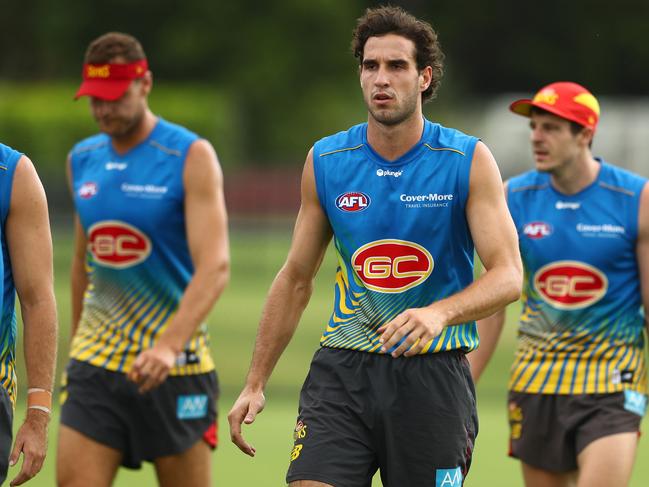
Witts is having what Dew believes is a season that will put him in contention for an All-Australian spot and his work at the source shows how Gold Coast’s game has evolved.
In the early years under Dew the ruckman would tap it directly down to a contest but is now sending the Sherrin wide to players on the move as Gold Coast look to open rivals up going forward.
Rankine struggled with injury and form early but has gone on to play his best football for the club, along with a host of others including fellow small forward Ben Ainsworth.
With his future now secure, Dew said striving for continual growth of the team was his priority over the coming two years.
“We want to keep driving this group,” Dew said.
“I want to be really cautious of using the aim of just making finals. It’s really hard to get there. There is an opportunity this year and we will look at getting as close as we can. If we get there then fantastic. Once you get there you have to make the opportunity count.
“We will keep pushing for each win and it’s important we hit the end of the line with some momentum and be ready for next year as well.”




